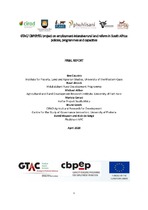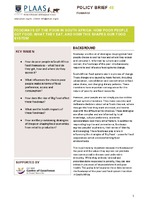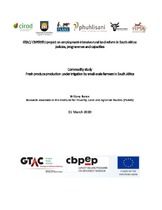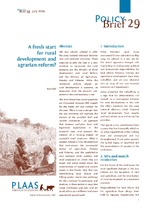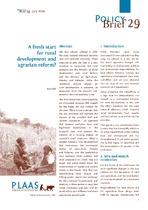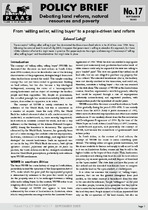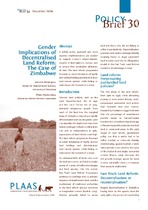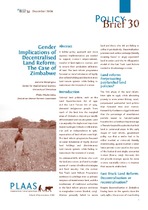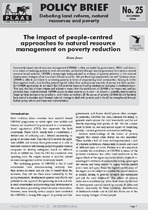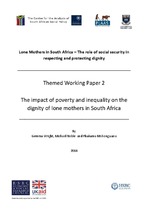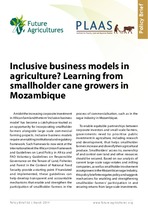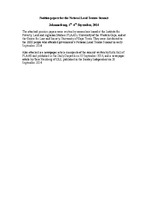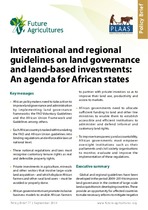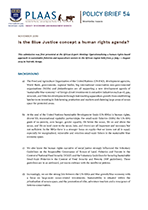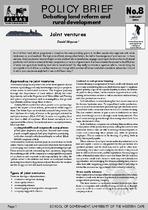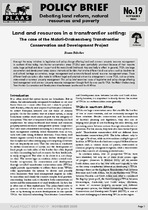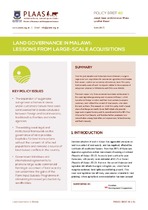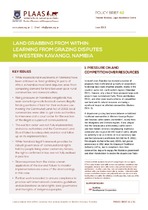Browsing Policy Briefs by Title
Now showing items 35-54 of 144
-
Final Report
(GTAC, 2020-03-31)This study focuses on the potential contribution of redistributive land reform to employment creation. Can land redistribution be undertaken in a manner that also creates jobs, and if so, through which types of land use ... -
Foodways of the poor in South Africa: How poor people get food, what they eat, and how this shapes our food system
(Institute for Poverty, Land and Agrarian Studies, University of the Western Cape, 2017)Foodways are the set of strategies shaping what food people choose as well as how and where they access and consume it. Informed by culture and social context, the foodways of the poor simultaneously respond to and ... -
Fresh produce production under irrigation by small-scale farmers in South Africa
(GTAC, 2020-03-31)This report documents the status of fresh produce production under irrigation by small-scale farmers2 in South Africa and investigates the potential for expanding current levels of production, with an emphasis on land ... -
A fresh start for rural development and agrarian reform?
(Institute for Poverty, Land and Agrarian Studies, University of the Western Cape, 2009)The commons (or common-pool resources)1 are the most important resources in southern Africa. The livelihoods of the majority and economies of most countries depend on them. Although common property regimes are often ... -
A fresh start for rural development and agrarian reform?
(PLAAS, University of the Western Cape, 2009-07-29)The new cabinet ushered in after the 2009 national elections features new and renamed ministries. Those expected to take the lead in a new initiative to resuscitate the rural economy are the Ministry of Rural Development ... -
From ‘willing seller, willing buyer’ to a people-driven land reform
(Institute for Poverty, Land and Agrarian Studies, University of the Western Cape, 2005)The concept of ‘willing seller, willing buyer’ has dominated the discourse on land reform in South Africa since 1994. Now, following the national Land Summit of July 2005, it appears that government is willing to abandon ... -
Gender implications of decentralised land reform: The case of Zimbabwe
(Institute for Poverty, Land and Agrarian Studies, University of the Western Cape, 2009)A bolder policy approach and more vigorous implementation are needed to support women’s empowerment, transfer of land rights to women, and to ensure their productive utilisation of land. The land reform programme focussed ... -
Gender implications of decentralised land reform: The case of Zimbabwe
(PLAAS, University of the Western Cape, 2009-12)A bolder policy approach and more vigorous implementation are needed to support women’s empowerment, transfer of land rights to women, and to ensure their productive utilisation of land. The land reform programme focussed ... -
The impact of people-centred approaches to natural resource management on poverty reduction
(Institute for Poverty, Land and Agrarian Studies, University of the Western Cape, 2006)Community-based natural resource management (CBNRM) is often promoted by governments, NGOs and donors as a means of reducing poverty in rural communities, particularly through income-generation from various natural res ... -
The impact of poverty and inequality on the dignity of lone mothers in South Africa
(Institute for Poverty, Land and Agrarian Studies, University of the Western Cape, 2014)The purpose of this themed working paper is to explore lone mothers’ accounts of what dignity means in the context of their lives and how the experience of poverty and inequality impacts on their sense of dignity. This ... -
Inclusive business models in agriculture? Learning from smallholder cane growers in Mozambique
(Institute for Poverty, Land and Agrarian Studies, University of the Western Cape, 2014)Amidst the increasing corporate investment in African farmland the term ‘inclusive business model’ has become a catchphrase touted as an opportunity for incorporating smallholder farmers alongside large-scale commercial ... -
Inclusive business models in agriculture? Learning from smallholder cane growers in Mozambique
(Institute for Poverty Land and Agrarian Studies (PLAAS), 2014)Amidst the increasing corporate investment in African farmland the term ‘inclusive business model’ has become a catchphrase touted as an opportunity for incorporating smallholder farmers alongside large-scale commercial ... -
Institute for Poverty, Land and Agrarian Studies, University of the Western Cape
(Institute for Poverty, Land and Agrarian Studies, University of the Western Cape, 2014)The attached position papers were written by researchers based at the Institute for Poverty, Land and Agrarian Studies (PLAAS), University of the Western Cape, and at the Centre for Law and Society, University of Cape ... -
International and regional guidelines on land governance and land-based investments: An agenda for African states
(Institute for Poverty, Land and Agrarian Studies, University of the Western Cape, 2014)Global and regional guidelines have been developed in the period 2009–2014 to improve land governance in the context of large-scale land acquisitions in developing countries. These provide an opportunity for affected ... -
International and regional guidelines on land governance and land-based investments: An agenda for African states
(Institute for Poverty Land and Agrarian Studies (PLAAS), 2014) -
Is the Blue Justice concept a human rights agenda?
(PLAAS, 2019-11-21)What is Blue Justice? This concept is situated in social justice for small-scale fisheries (SSFs)—a narrative popular with civil society movements and academics to garner support for the adoption and implementation of the ... -
Joint ventures
(Institute for Poverty, Land and Agrarian Studies, University of the Western Cape, 2004)South Africa s land reform programme is based on the state providing grants to landless people who negotiate with white landowners to purchase land. The high price of land, among other factors, has led to the emergence ... -
Land and resources in a transfrontier setting
(Institute for Poverty, Land and Agrarian Studies, University of the Western Cape, 2005)Amongst the many initiatives in legislative and policy change affecting land and common property resource management in Southern Africa today, transfrontier conservation areas (TFCAs) seem particularly prominent because ... -
Land governance in Malawi: Lessons from large-scale acquisitions
(Institute for Poverty, Land and Agrarian Studies, University of the Western Cape, 2015)Over the past decade rural Malawians have witnessed a surge in large-scale land acquisitions for commercial agriculture that threaten their access, control and ownership of customary land. This policy brief presents ... -
Land grabbing from within: Learning from grazing disputes in Western Kavango, Namibia.
(Institute for Poverty, Land and Agrarian Studies, University of the Western Cape, 2015)In recent years Namibia has received a number of proposals from multinational agricultural corporations to develop large-scale irrigation projects, mainly in the country’s water-rich, north-eastern regions (Odendaal 2011). ...

